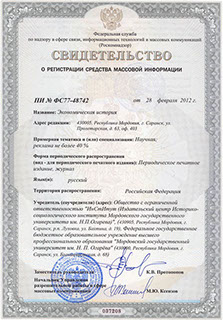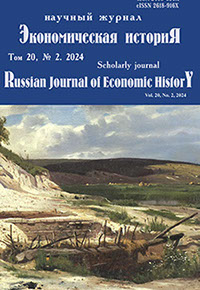Экономическая историЯ
Russian Journal of Economic History
ISSN 2409-630X (Print)
ISSN 2618-916X (Online)
Expert board:
- Scientific Council of RAS on economic history;
- Research and Educational Center «The economic history of Central Russia and the Middle Volga region» of Ogarev Mordovia State University;
- Center of Economic History of Lomonosov Moscow State University
Navigation
Certificate of registration

ISSN 2409-630X (Print), ISSN 2618-916X (Online)
DOI: 10.15507/2409-630X.065.020.202402.168-179
УДК 930
Oleg V. Shchuplenkov1, Nikolai O. Shchuplenkov2
1, 2 Stavropol State Pedagogical Institute, branch in Yessentuki (Yessentuki, Russia),
1 e-mail: oleg.shup@gmail.com
2 e-mail: veras-nik@yandex.ru
The Political Aspect of Monetary Policy in the French Mandate of the League of Nations in Syria and Lebanon
Abstract
Introduction. The article explores how the colonial logic of government in the French mandate of the League of Nations in Syria and Lebanon lost its positivity and came into conflict with the international logic of the League’s technocratic rule, especially in the economic and political spheres. The shortage of gold around the world influenced French politics not only in how it crystallized in monetary diplomacy, but also in how it affected the French economy, at the Brussels Conference of 1920. and the Genoa Conference of 1922, but also on the economic difficulties faced by the low level of government on the borders of the French Empire.
Materials and Methods. The research uses materials from the Center for Economic and Financial Archives, Savigny-Le-Temple, France (CAEF). The problem-chronological method is used, as well as a macro-historical approach to consider global events at the level of the Mediterranean region.
Results. Having studied the evolution of French imperial capital, the authors stated that the combination of mechanisms called “presidential money” provided the PMK with partially suitable ground for analysis and criticism, as well as for supporting French imperial rule.
Discussion and Conclusion. The focus is on the creation and development of the Bank of Syria and Greater Lebanon in the early 1920s, as well as the new paper money it issued. Exploring the imperial and international politics of this sharply criticized new currency, the article contains a proposal to pay more attention to money as a key element used by France in an effort to regulate its own economic system by using the resources of international institutions.
Keywords: bank, currency, committee, Lebanon, League of Nations, Syria, French mandate.
For citation: Shchuplenkov O. V., Shchuplenkov N. O. The Political Aspect of Monetary Policy in the French Mandate of the League of Nations in Syria and Lebanon. Ekonomicheskaya istoriya = Russian Journal of Economic History. 2024; 20(2): 168–179. (In Russ.). DOI: 10.15507/2409-630X.065.020.202402.168-179.
© Ogarev Mordovia State University. History and Sociology Institute, 2017
68, Of. 411, Bolshevistskaya St., 430005, The editorial office of the scholarly journal «Russian Journal of Economic History»
Tel.: (8342) 24-25-90; 27-07-11, Fax: (8342) 24-25-90, E-mail: jurnal-econom-hist@isi.mrsu.ru
Designed by A. Napalkov, Email: napalkov@isi.mrsu.ru

